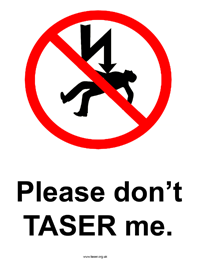Speaking in a Westminster Hall debate on Wednesday the 28th of January 2009, Vernon Coaker the Home Office Minister of State for Policing, Crime & Security spoke on the expanded deployment of TASER:
With regard to Taser training, the roll out of Tasers has been widely welcomed as a good thing. The training costs will be a matter for individual forces. Clearly, the number of Tasers that a force has is not dictated centrally. It is a matter for individual chief constables, with their authorities, to determine what they should have.
This clearly states that police authorities have a role in determining if TASERs should be issued to non-firearms officers in their force areas. Within hours of the ministerial announcement the Metropolitan Police Authority decided not to extend TASER use to all front line response officers in London on the grounds that they may cause fear and damage public confidence. However Cambridgeshire Police Authority are still reluctant to act, not mentioning the subject at all during their December 2008 meeting.
Mr Wilkins, Liberal Democrat County Councillor and member of the Cambridgeshire Police Authority has written to me to say that members of the Cambridgeshire Police Authority met with their Chief Constable to discuss TASERs in early January. Mr Wilkins said:
Senior Officers [said] that the Metropolitan Police Authority’s motion against TASERs did not bind the Met Commissioner not to use them, and that similarly any motion passed by Cambridgeshire PA would similarly not bind the Chief Constable.
That there is no intention to deploy TASERs routinely, but that their deployment will be wider than firearms suggests to me that passing a motion at the CPA would achieve little.
I have written back to Mr Wilkins to say that I think the ministerial speech made clear that the decision on TASER deployment is one in which the Police Authority has a role. It is very clear to me that this is a matter of strategy and not an operational matter for the police and so firmly within the remit of the Police Authority.
Mr Wilkins said the Chief Constable had assured members of the Authority that TASERs would be for the use of specially-trained officers only. I have suggested he ask questions about the substantive nature of that training and if regular refresher training would be required. However well trained these officers are, it is unlikely their skills in judging how to respond to a situation will be as refined as those of dedicated firearms officers who face the sorts of extremely dangerous situations where a TASER discharge might be considered on a more regular basis.
I support police firearms units having access to TASER weapons which they can elect to use as an alternative to firearms in circumstances where they would otherwise use firearms. I said I would prefer to be shot with a TASER than with a gun. However I do not want to live in a country where more police officers than necessary are routinely armed with TASERs. I believe any expansion of TASER use would be damaging to the relationship between the public and the police.
As for Vernon Coaker’s comment that: “the roll out of Tasers has been widely welcomed as a good thing” I do not believe there is any basis for that statement. In 2004 an Association of Chief Police Officers survey found that:
- Awareness of Taser is generally quite low: Only 36% thought they knew what a Taser was.
- 38% thought that all officers should be allowed to use Taser
- 90% thought that firearm and specially trained officers should be allowed to use Taser (this figure includes those who thought that all officers should be allowed to use Taser)

3 responses to “The Role of Police Authorities in Decisions to Extend TASER Deployment”
On the 12th of January Cambridge’s MP David Howarth signed a motion stating:
He needs to persuade Mr Wilkins to fulfill his role at the Police Authority. Mr Wilkins is employed by Mr Howarth as his “Office Manager” so they ought to be able to talk to each other.
The LibDems nationally express concern about Taser use – on children!
http://www.theregister.co.uk/2009/02/25/uk_tasering/
Thanks for the link to that article, it raises the question of why – given the Liberal Democrat national opposition to the policy is Mr Wilkins, a Liberal Democrat on Cambridgeshire Police Authority, not using his position to oppose the expanded TASER deployment?